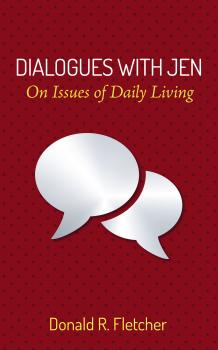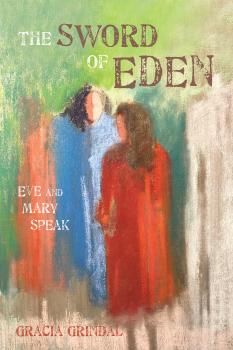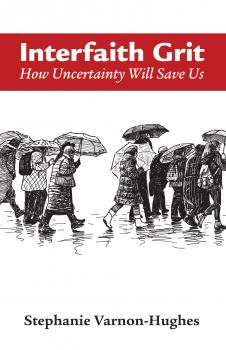ТОП просматриваемых книг сайта:
Религия: прочее
Различные книги в жанре Религия: прочее, доступные для чтения и скачиванияАннотация
Jack and Diane. Two names joined in the common parlance by a pop song. They are also the aliases of two people whose real names–Adam and Eve–are no less joined in the common parlance, and represent the divine calling they share–a calling to show humanity the way back to the garden of Eden. Neither knows the other exists until their travels lead them to the same town. It is there that their mission begins–a mission that unleashes terrors, teaches lessons, and yields the answers they hope will lead a world blinded by guilt, fear, and hatred, into a place more closely resembling the state of man's original perfection.
Аннотация
In Dialogues with Jen: On Issues of Daily Living, five friends, representing three generations, get together to discuss contemporary topics that touch their lives. The six dialogues unfold dramatically, reflecting situations of the participants, who share personal insights, sometimes surprisingly. Jen, the senior member, suggests the lead topic of romantic love, and the discussion moves from carnal attraction to conscious, purposeful love, citing Shakespeare's «marriage of two minds.» Events of the tragic death of one member's sister and a terrorist attack witnessed by another member lead them to consider guilt, justice, and forgiveness. The dialogues are deeply rooted in spirituality, while not specific to any particular religious tradition. The author loosely draws on the classic Dialogues of Plato to develop arguments through the exchange of ideas of his fictional characters. This book is a sequel to Dialogues with Jay: On Life and Afterlife, but can be read independently.
Аннотация
The Sword of Eden tells the story of Eve and Mary from their points of view. It connects their lives–Eve as the mother of us all, looking forward to the birth of one who is promised to bruise the head of the serpent in the garden, and Mary as the New Eve whose son will do so. They tell their own stories which are central to the biblical story of salvation as well as their typical lives as women, wives, and mothers. Grindal has used sonnet forms to tell their stories.
Аннотация
Recinos discovered a love for poetry after being abandoned by Latino immigrant parents and living on the streets dealing with drugs, poverty, violence, racial discrimination, and existential desolation. After several homeless years, he was taken into the family of a white Presbyterian minister and guided back to school. Later, attending graduate school in New York City, Recinos befriended Nuyorican poets the late Miguel Pinero and Pedro Pietri who encouraged him to write and read poetry at the Nuyorican poets cafe. Word Simple is a collection of poetry that raises questions about how society is constructed from the context of people who are routinely silenced by history. Recinos' poems describe the realities of faith, love, struggle, migration, refugee flight, urban depravity, the politics of hate, and the fierce anger of the indignity of a life of marginality in society. His poetry not only expresses outrage and despair in the face of unjust suffering in the world, but he projects the struggles and beauty of invisible people who tilt always toward recognition. By his choice of subjects in his poetry, Recinos provides readers with sensitive and ethical resources to show the horror and joys of life. Graffiti on a page!
Аннотация
The four classic tales in this volume illuminate Leo Tolstoy's radical orientation toward war and commerce, revealing his vision for a sustainable, peaceable world. The feature story, Ivan the Fool, presents an archetypal fool who works hard, cooperates with everyone, and manages to foil every attempt to cause his downfall. In the end, peasant life comes out on top, while the pillars of imperial Russian society topple down. Esarhaddon, King of Assyria explores a king's empathy-based revelation to end all violence; and A Grain as Big as a Hen's Egg playfully looks at the relationship between health, soil, labor, and food economies. Three Questions sums up Tolstoy's highest ideal of serving others in the present moment. Some may critique these stories as being too simplistic or too moralistic. But these tales have stood the test of time precisely because they entertain well while evoking universal truths that lift us above humanity's self-serving impulses.
Аннотация
Crosby claims that much of the Bible is myth. Since some myth may be true, the next step is to label that part of myth adjudged to be untrue, such as folklore. But myth and folklore are not necessarily the same. Lore serves further as an interpretation, elucidation, embellishment, or spin upon the myth. This lore, in turn, may help clarify one's beliefs or it may enable one to see more clearly what is essential to one's faith or nonessential. Crosby follows the exegesis and biblical criticism norms of Albert Schweitzer's quest of the historical Jesus with emphasis on mythus pioneer David Friedrich Strauss. Theology meets biology and physiology in culmination with all biblical study. This takes place in the sapiens brain, the supreme source of all language and imagination via which we invent the reality in which we choose to dwell.
Аннотация
These poems are not muscular, literary, or award-winning. Instead they are slightly dangerous, filled with banana peels, sharp objects, reflex hammers, and various items you could not send through US mail. They also contain stories, possibly one of the most dangerous things ever invented. There are stories about trees, people, other people, artwork, near-misses of artwork, bears, barns, and a convention of angels. There are stories of forgiveness, remembrance, peaches, peonies, and poems themselves. For ease of use, each poem is equipped with useful punctuation marks and extra white space. Handle with care. You may be stuck with them.
Аннотация
The lexicon of the church is confusing to those who are not a part of the culture. Given the great commission and our call to «make disciples» (Matt 28), I have thought a lot about how to explain some of the terms long time church attenders are very familiar with in a way that invites new believers into the conversation that has been going on for centuries.
This devotional includes definitions of words often used in Scripture and church culture. All of the definitions are taken from the online version of Miriam-Webster's dictionary or dictionary.com. The explanations are shared for further understanding of context in Scripture and culture. The goal is to ensure what is common for some is understood by all.
This devotional includes definitions of words often used in Scripture and church culture. All of the definitions are taken from the online version of Miriam-Webster's dictionary or dictionary.com. The explanations are shared for further understanding of context in Scripture and culture. The goal is to ensure what is common for some is understood by all.
Аннотация
A funeral is naturally associated with grief, totally focused on the finality of the loss of a loved one or friend. This overwhelming emotion often has a tendency to overshadow who the decedent actually was and the positive impact that individual made on the lives of those attending the ceremony, a community, a work place, a church, or even the world as a whole! The role of the Celebrant is designed to change all that! A Celebrant's goal is to creatively highlight those life impacts through loving, meaningful words, songs, and even dynamic visual displays–to turn tears of grief into tears of joy! Nothing can set the stage for such a celebrative atmosphere more than a poem applicable to or personally descriptive of the one we have lost. Reverend Phipps wrote Poems for the Funeral Celebrant to give you, the Celebrant, or any who may face the challenge of leading a funeral/memorial service, a guide and resource from which to help families through this difficult time in their lives.
Аннотация
This book is meant for every family member, colleague, and airplane seatmate who has asked me a variation of the following question: «Why is the world like this? What can I do?»
Being human is a messy endeavor. We are made to be in relationship–built for community, craving to be known and seen and heard, better together. And yet, some flaw in us allows us to dwell on difference and allows diversity to become divisiveness. We fear the unknown. We resist the new. We turn strident and hateful when made to change. Why is this?
I believe that leaning into the unknown is a transformative skill. We can practice becoming okay with difference. We can become virtuosic at embracing the unknown. When we learn that diversity will indeed transform us–body, soul, and nation–we can systematically name, teach, and celebrate the practices that help us persevere in shaky places.
Being human is a messy endeavor. We are made to be in relationship–built for community, craving to be known and seen and heard, better together. And yet, some flaw in us allows us to dwell on difference and allows diversity to become divisiveness. We fear the unknown. We resist the new. We turn strident and hateful when made to change. Why is this?
I believe that leaning into the unknown is a transformative skill. We can practice becoming okay with difference. We can become virtuosic at embracing the unknown. When we learn that diversity will indeed transform us–body, soul, and nation–we can systematically name, teach, and celebrate the practices that help us persevere in shaky places.










